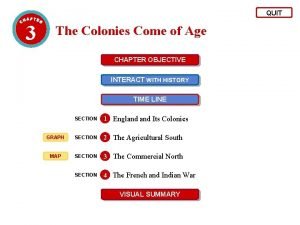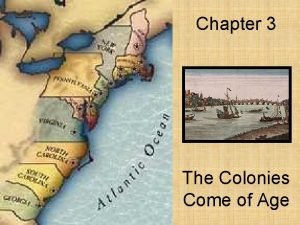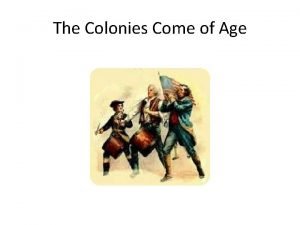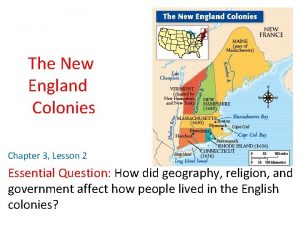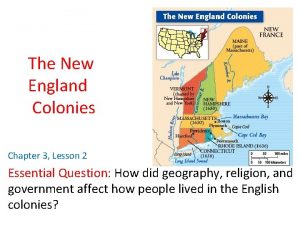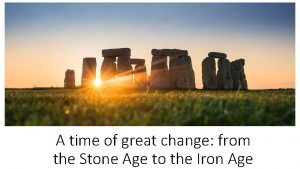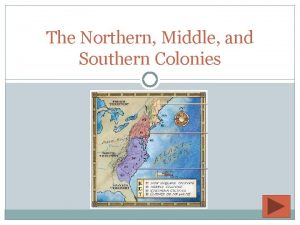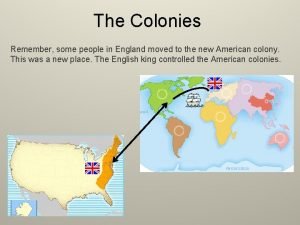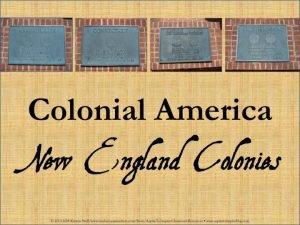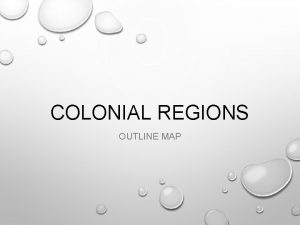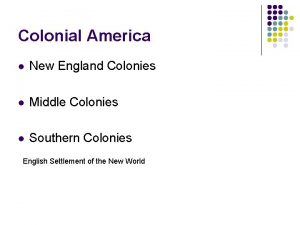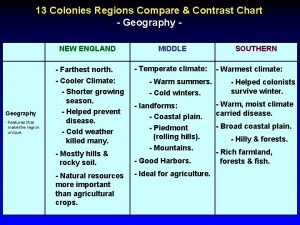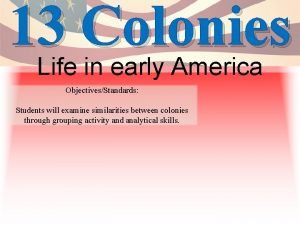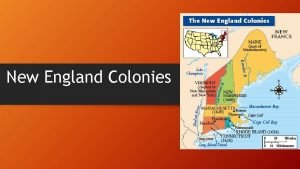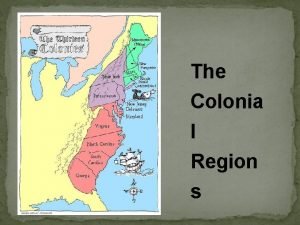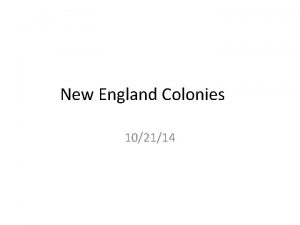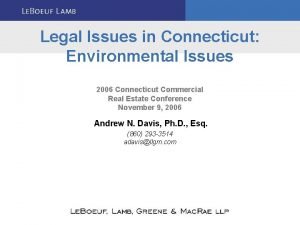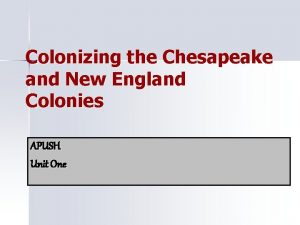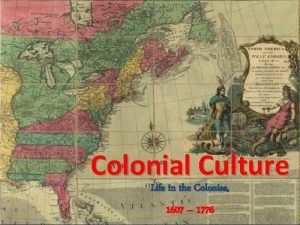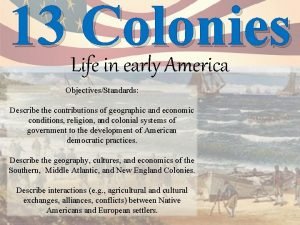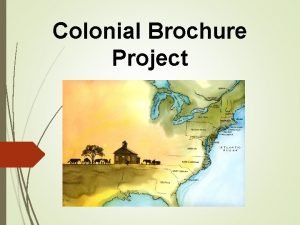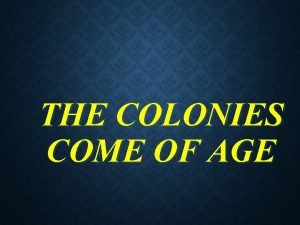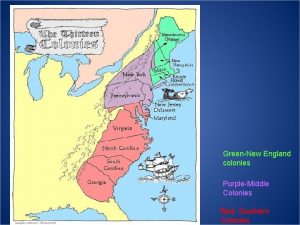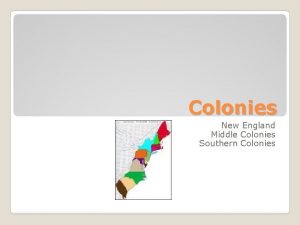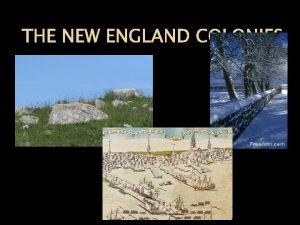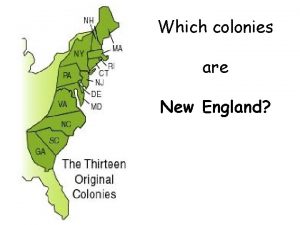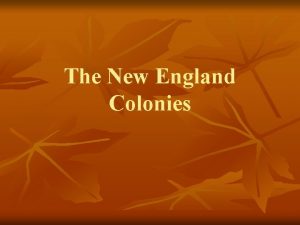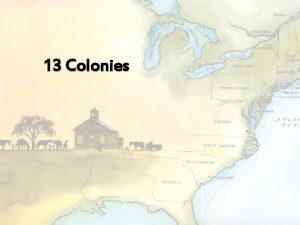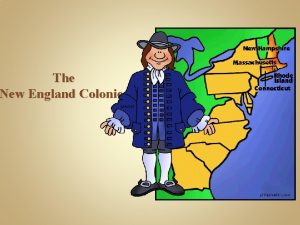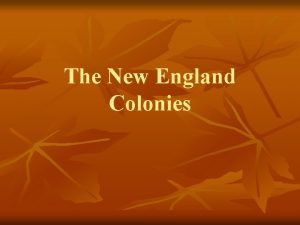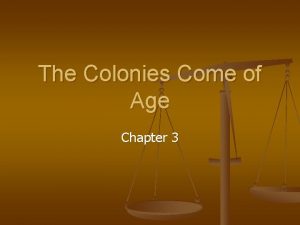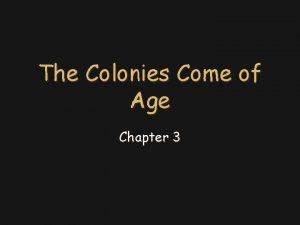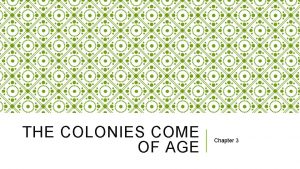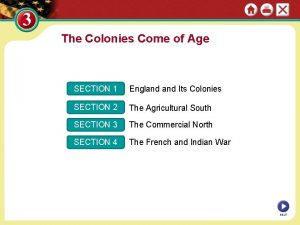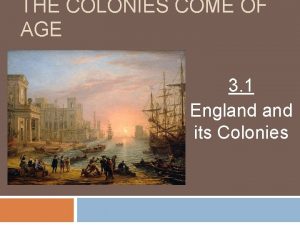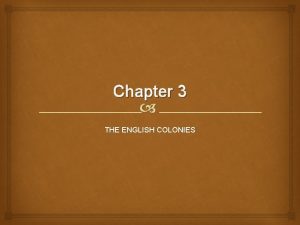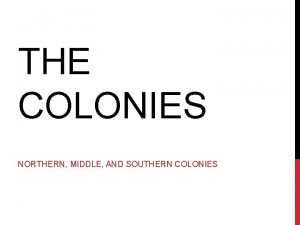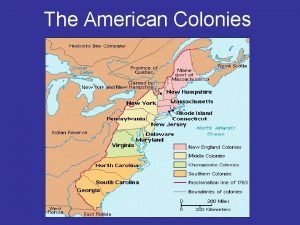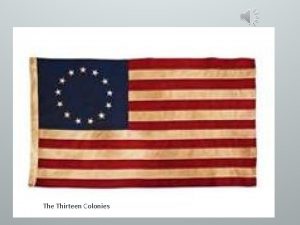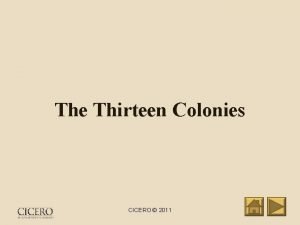CHAPTER 3 The Colonies Come of Age England

































- Slides: 33

CHAPTER 3 The Colonies Come of Age

England Its Colonies Prosper Britain’s interest in est colonies was influenced by theory of mercantilism Mercantilism: An economic system in which nations seek to increase their wealth and power by obtaining large amounts of gold and silver and by est a favorable balance of trade � Favorable out balance meant more gold coming in than going Britain looked to colonies as a market for British goods and as a producer of goods and materials to be sold to other nations

Navigation Acts Not all the products colonists produced ended up in England- some made their way to France, Spain and Holland � Colonists saw as opportunity to increase their wealth English not happy because they saw this as economic threat Result was Parliament’s creation of the Navigation Acts in 1651 � Series of laws that restricted colonial trade

Navigation Acts The Navigation Acts Benefited England because jobs were created for English dockworkers and import taxes for treasury 1. No country could trade with the colonies unless the goods were shipped in either English or colonial ships 2. All vessels had to be operated by crews that were at least three-quarters English or colonial 3. The colonies could export certain products only to England By allowing trade only by English or colonial ships this created a boom in the colonial shipbuilding industry 4. Almost all goods traded between the colonies and Europe first has to pass through an English port

The Glorious Revolution King James very unpopular in colonies In 1688 had a son- became possible that there would be a dynasty of Roman Catholic monarchs in England

1689: Parliament votes to offer the throne to William and Mary and est. more power over the monarchy �Known as the Glorious Revolution In the colonies… �Colonists in Mass. staged a bloodless rebellion �Parliament restored the colonies of New England to their original status �More religious toleration and non-Puritan representation in the colonial assembly

Salutary Neglect Salutary Neglect: an English policy of relaxing the enforcement of regulations in its colonies in return for the colonies continued economic loyalty In the years following the Glorious Revolution Parliament strengthened the Navigation Acts in 2 ways � 1. Smuggling trials moved from colonial courts with jury of colonists to England with English judges � 2. Created Board of Trade- advisory board with broad power to monitor colonial trade Although appeared England tighten colonial grip it actually loosened its hold

Seeds of Self-Government Without being watched by England the colonists began developing ideas for self-government Besides a desire for more economic and political breathing room the colonies did not have anything in common to unite them against England � Northern and Southern colonies were developing distinct societies based on very different economic systems

Plantation Economy Arises

Southern colonies had rich soil Cash crop: a crop grown by a farmer for sale rather than for personal use � Tobacco, rice, indigo Plantations developed instead of towns � Long and deep rivers allowed plantation owners to ship goods directly to northern colonies using ships No need for shops, bakeries or markets because plantation produced what was needed on the property Rural and self-sufficient society

Life in Southern Society Large numbers of European immigrants helped to make the South more diverse Plantations and the owners controlled much of the South’s economy, politics and social institutions Chesapeake Bay region extremely wealthy- economic

Shirley Plantation House Built in 1723 Birthplace of Robert E. Lee’s mother Virginia’s first plantation Oldest active plantation in Virginia One of the oldest family-owned businesses in North America, Declared a National Historic Landmark in 1970.


Life in Southern Society Women had few legal or social rights- bowed to husbands Little formal education- focused on learning domestic duties Indentured servants also low on the social ladder Struggled to survive on the outskirts of the Southern colonies

Africans Cope in Their New World Developed a way of life based on their cultural heritage Kept alive musical traditions and retold stories of their ancestors Because slave merchants tore apart many families, slaves created new families among the people they lived with � If a parent was sold, others would step in to raise the child left behind

Stono Rebellion Many slaves resisted their position by faking illness, breaking tools and staging work slowdowns Stono Rebellion- September 1739 � 20 slaves gather at Stono River SW of Charlestown � With guns and weapons they killed several planter families and invited other slaves to join them in their plan to flee to Florida � White militia eventually surrounded slaves and

Although rebellion failed, it sent message to Southern colonies to tighten up already harsh slave laws Despite severe punishments that escapes brought, between 1736 -1801 at least 1, 279 slaves tried to run � Many found refuge with NA tribes

Commerce Grows in the North Between 1650 -1750 the colony’s economy grew twice as fast as England’s � Most growth occurred in Middle and New England colonies NE and Middle colonies produced several different crops and raised a variety of livestock � Smaller farms Commercial economy also booming � Manufactured England ships and produced more iron than By mid-1700 s merchants were one of the most powerful groups in the north

Commerce Grows in the North Crops and Livestock Commercial Economy Wheat Grinding wheat Corn Harvesting fish Cattle Sawing lumber Hogs

Urban Life Expansion in trade caused port cities to grow � Less in the south- more in the north (Boston, NYC, Philly) Philadelphia was first city since ancient Rome to be laid out in grid like pattern � Number of open squares for public use-important for urban planning in the future Philly was a sophisticated city but high concentration of people without adequate public services caused problems � Garbage and clean water


Northern Society is Diverse Northern colonies attracted a variety of immigrants � German Northern colonies had less incentive to turn to slavery but still did exist � Still and Scots-Irish were largest groups racial prejudice against blacks- free or enslaved Slaves in New England did enjoy greater legal status than other parts of the colonies � They could sue and be sued

The Enlightenment: an 18 th ce intellectual movement that emphasized the use of reason and the scientific method as means of obtaining knowledge Ideas spread from Europe to the colonies in books and pamphlets � Most of NE could read due to Puritan support of public education Ben Franklin and Thomas Jefferson became Enlightenment figures in the colonies � Obtain truth through experimentation and reason � Use reason to conclude that individuals have natural rights

The Great Awakening: a revival of religious feeling in the American colonies during the 1730 s and 1750 s � Puritans had lost grip on society and church membership in decline Used counter the currents of the Age of Enlightenment Reaffirm the view that: � being truly religious meant trusting the heart rather than the head � prizing feeling more than thinking � relying on biblical revelation rather than human reason

The Great Awakening Many preachers, such as Jonathan Edwards, traveled from village to village getting people to rededicate themselves to God � Attracted thousands and meetings held outside Brought colonists, Native Americans and African Americans into organized Christian churches

The Great Awakening Pros Other denominations. Baptists and Methodists- gained new members Cons Increased interest in higher ed to train ministers � Princeton, Brown, Colombia, Dartmouth Caused people to question traditional authority De-emphasize church authority

France’s North American Empire In 1750 s France was Great Britain’s greatest rival in their struggle to build a world empire � Fought over Ohio River Valley French originally settled in the North (Quebec) and the South (Louisiana) French colonists had friendlier relations with Native Americans � Traded furs and had military alliances

England Defeats an Old Enemy As French empire expanded it collided with growing British empire British goal was to drive the French out of the Ohio Valley French soldiers and their Native American allies often had the upper had due to their gorilla tactics � British soldiers accustomed to enemies who marched in orderly rows

England Defeats an Old Enemy After many defeats by the French, the war took a dramatic turn for the British in Sept. 1759 Treaty of Paris � Ambushed the French at night and took control of Quebec � Led to victory in the war French and Indian War officially ended in 1763 with Treaty of Paris � England claimed all of North America east of the Mississippi River � Spain gained the French lands west of the Mississippi

Victory Brings New Problems Claiming ownership of the Ohio River Valley brought England trouble Native Americans soon realized that a French loss was also a loss for them and they were not pleased NA forces captured 8 British forts in the valley and attacked two others � British responded by presenting smallpox-infested blankets to NA during peace negotiations Weakened by disease and war most NA groups negotiated treaties with England

Victory Brings New Problems To avoid further conflict with Native Americans, England issued the Proclamation of 1763 � Banned all settlement west of the Appalachians However, the British could not enforce this ban and colonists continued moving west

Colonies and Britain Grow Apart Because the Proclamation of 1763 halted expansion it convinced the colonists that England did not care about their needs 1761: Massachusetts governor authorized ‘writ of assistance’ � Allowed British customs officials to search any ship or building to crack down on colonial smuggling Merchants of Boston were outraged

Problems Resulting From the War British government stationed 10, 000 Sugar Acttroops to the territories to control Native Americans and former French subjects � � Lowered the tax on molasses in hopes that colonists would stop smuggling it � Placed taxes on certain imports � Allowed smuggling cases to be tried in strict military courts Colonists saw this as a standing army that might turn against them French and Indian War doubled the national debt so the country needed to raise money 1764: Prime minister George Grenville asked Parliament to enact the Sugar Act
 The colonies come of age answer key
The colonies come of age answer key Chapter 3 the colonies come of age
Chapter 3 the colonies come of age The colonies come of age
The colonies come of age Chapter 3 lesson 2 the new england colonies
Chapter 3 lesson 2 the new england colonies Guided reading lesson 2 the new england colonies
Guided reading lesson 2 the new england colonies Chapter 3 section 1 england and its colonies
Chapter 3 section 1 england and its colonies Come rico come sano come pescado
Come rico come sano come pescado Stone age, bronze age iron age timeline
Stone age, bronze age iron age timeline Iron age bronze age stone age timeline
Iron age bronze age stone age timeline Southern colonies
Southern colonies North middle and southern colonies
North middle and southern colonies New england colonies leaders
New england colonies leaders The middle colonies were characterized by
The middle colonies were characterized by L
L New england colonies facts
New england colonies facts First 13 states
First 13 states 13 colonies compare and contrast
13 colonies compare and contrast Middle colonies
Middle colonies Pegs new england colonies
Pegs new england colonies New england rocky soil
New england rocky soil New england colonies terrain
New england colonies terrain New england colonies climate
New england colonies climate New england colonies definition
New england colonies definition New england, middle and southern colonies comparison chart
New england, middle and southern colonies comparison chart New england colonies drawings
New england colonies drawings New england colonies
New england colonies New england colonies labor source
New england colonies labor source Economy of middle colonies
Economy of middle colonies New england mid atlantic and southern colonies
New england mid atlantic and southern colonies Colonial brochure project
Colonial brochure project Come holy spirit, come hymn
Come holy spirit, come hymn He-y come on ou-t story
He-y come on ou-t story Come thou fount come thou king
Come thou fount come thou king Tear past participle
Tear past participle
